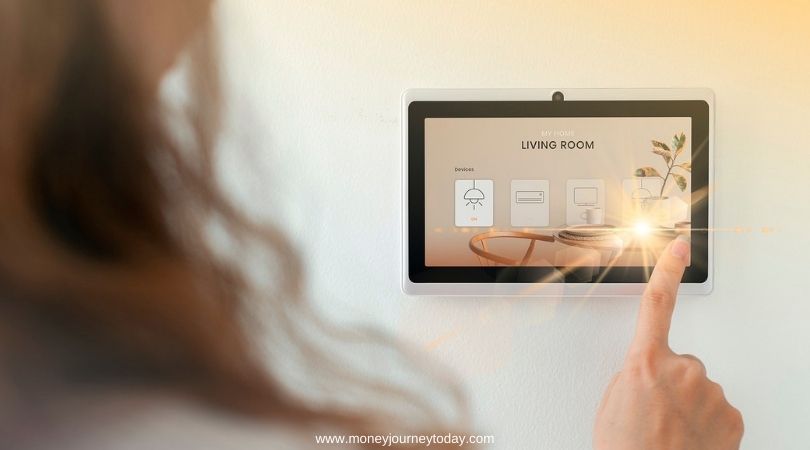When you start pondering how best to save on utilities, you may think that as a renter, your hands are tied. But that’s not the case. While you may not have the option of upgrading your appliances to Energy Star or water saving versions, you can make many smart choices to reduce your usage and lower your utility bills.
With flexibility being so important for renters, it’s important to think about temporary solutions. So here are some ways you can change your habits and add some short-term upgrades to your rental that you can take with you when you move!

How Renters Can Save On Electricity
Did you know that the average American uses 35% of their home’s energy to power appliances, lights, and electronics? Start chipping away at your energy use in these three categories to see major savings.
Appliances and electronics are sucking energy all the time, even when they’re not in use. Even small devices like your phone charger are pulling juice all the time. To prevent this, plug appliances and electronics into smart power strips that you can switch off. By turning off the strip, you can stop devices like your television, microwave, gaming system, and Blu-Ray player from costing you money when you’re not using them.
Lights can also waste energy. Incandescent bulbs create both light and heat when they’re on. Swap them out with efficient LEDs that stay cool and use less electricity.
Pro tip: Save the old incandescent bulbs somewhere safe. When you move out, take your LEDs with you and put the incandescent bulbs back in their fixtures. LEDs cost a bit more than regular bulbs but they last for years. So you should get all the use out of them you can!
Another huge energy user? Air conditioning. Keep your system from working overtime by swapping out your unit’s filter every month. Plus, try turning the temperature up a degree or two, and using the ceiling fan to keep the air moving. Just this small change can add up to major savings over the course of a hot summer.
How Renters Can Save On Gas
Gas bills can range dramatically based on where you live and the kind of appliances your home uses.
If you live in the south where you don’t need to heat your home as much, and have an electric stovetop and water heater, your bill could be minor. But if you live up north, and you heat your home, stove, and water with gas, this bill can add up.
For quick savings, turn the thermostat down a couple degrees, and instead put on an extra layer to stay comfortable. A sweater and pair of thick socks will keep you cozy, even if the apartment is cool.
If you’re in a home with your own gas water heater, you may also want to turn the heater’s temperature down slightly. Water heaters are running all day long to keep the water hot, and sometimes they’re kept much hotter than necessary. Keep your water at 120°F or warmer, as recommended by the EPA.
How Renters Can Save On Internet
Saving on internet as a renter can be complicated. Some complexes have exclusive agreements with internet service providers (ISPs), which can prevent you as an individual from shopping around and finding better rates. Plus, upgrading hardware and cables—required to use Google Fiber or AT&T Fiber—may not be an option.
But if you can choose your own ISP, call around to find the best rates. Even if you already have a provider, you may be able to get a better rate by offering to switch companies.
And if you have to use the internet that the complex provides, you should definitely talk to the neighbors. With so many people working from home these days and relying on the internet for our entertainment, bad service can be more than a minor inconvenience.
How Renters Can Save On Water
So much of our water bills come from waste! This is actually a great thing if you’re looking to save. It means that you have more control over this bill than you might think.
We’ve all turned the shower on, and then picked up our phones “just for a second” while the water heats up. How many gallons run down the drain while you’re scrolling Instagram? If you stand there for four minutes, you’ve wasted eight gallons of water. And every gallon will show up on your bill. Instead, use the seconds while the water heats up to set a timer on your phone. When the timer goes off, the shower is over!
After dinner, let the dishwasher do the work for you, rather than doing your dishes by hand. Modern dishwashers are extremely water efficient, unlike hand washing. Turn the water off when you’re doing any dishes that can’t go into the dishwasher, brushing your teeth, or washing your hands.
And while replacing appliances probably isn’t an option as a renter, you can swap out your showerhead for a more water efficient model. All you’ll need is a new showerhead and some thread tap to create a tight seal. You can replace the old one before you move out.
Moving and Utilities
When you’re considering a new apartment, think beyond just the cost of rent. There can be hidden utility costs in your new rental that you may not have considered.
If you’re looking to rent in an apartment complex, you may want to ask a couple neighbors what they pay per month in utilities to see if the rates seem reasonable. Why not just ask one person? Because they may be a utility waster—unlike you! Instead, ask a couple tenants to get a better average.